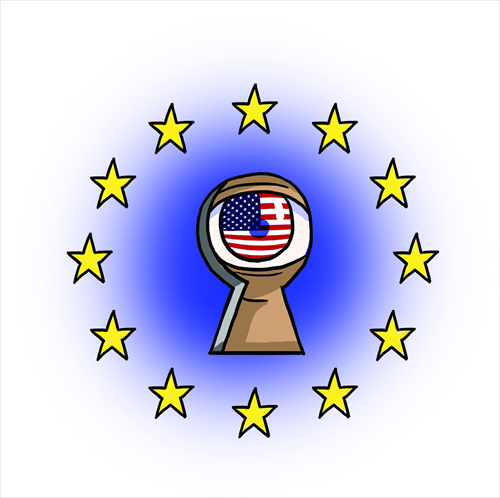HOME >> OP-ED
Spying scandal bump in Euro-US relations
By George N. Tzogopoulos Source:Global Times Published: 2013-11-14 0:08:01

Illustration: Liu Rui/GT
When Barack Obama won the US presidential election in November 2008, a climate of euphoria dominated Europe. "Obamamania" was widespread in capitals such as Berlin and Paris. Frustration at the militaristic and unilateral approach of then president George W. Bush had led various European governments to consider his replacement by Obama as a turning point.
Nevertheless, the charismatic leader has not lived up to high expectations. Five years after he entered the White House, Obama has failed to introduce new transparency rules in his country's surveillance policy.
The Edward Snowden scandal has not only revealed the unacceptable practices of the NSA, but has also led transatlantic relations into a new period of high tensions. Continuous reactions from the part of the EU and individual states such as Germany and France confirm the current disappointment and anger in Europe.
It is not the first time that the US and western Europe have seriously disagreed. Even during the Cold War when the common confrontation of the Soviet Union united both sides, there were internal divisions among NATO members.
The Suez episode of 1956 is the obvious example, where Britain and France conspired with Israel to attack Egypt without the support of the US. Additionally, France's withdrawal from NATO's integrated command structure in 1966 highlighted transatlantic tensions.
Other crises came in the aftermath of the fall of the Berlin Wall. The Kosovo war in 1999 outlined the disagreement between the US and Europe over the role of the UN. At that time, European allies, led by France, prioritized the importance of this international organization, as opposed to Washington which was not paying particular attention to international law.
George W. Bush's administration made conditions far worse. With the exception of a few months of solidarity and cooperation in the immediate aftermath of the 9/11 attacks including the military campaign against Afghanistan, Washington's preparation for the Iraq War without a UN mandate generated high percentages of anti-Americanism in Europe.
For his part, the then US defense minister Donald Rumsfeld made a distinction between "old" and "new" Europe referring to countries opposing and supporting US foreign policy respectively.
Relations between the US and Europe have a long history of problems and disagreements. The current crisis following Snowden's revelations on US espionage can be better understood if placed within this historical context. Both sides cannot always share common ground on all areas and issues. This is a natural development.
But history suggests that allies are able to overcome misunderstandings, make compromises, find mutually accepted solutions, and lead their relationship back to normalcy in order to serve their interests. The US-Europe relationship, for instance, was running relatively smoothly for many years until the Snowden scandal in spite of the earlier antagonism because of the invasion of Iraq.
A similar compromise will likely be found on US surveillance policy. Washington and Brussels can certainly cooperate and agree on an efficient balance between the need for security and the protection of personal data.
In other words, they have the capacity for respecting civil liberties without risking undermining security.
In the final account, information disclosed by the young US whistle-blower is hardly surprising. Espionage is not a revolutionary practice in international relations, nor is it exclusively conducted by the NSA. European intelligence agencies have their own histories of corporate and political espionage. The aggressive reaction on the part of European governments is partially justified, but is also striking a pose for domestic consumption.
Allies such as the US and Europe are well aware that challenges at the international level can be better dealt with if they cooperate closely. The Snowden scandal itself may generate a new, difficult and exhausting debate on how to improve and boost transparency in surveillance, but does not constitute such a critical issue to drive allies apart. The US and Europe still share more than divides them.
The author is a research fellow at the Hellenic Foundation for European and Foreign Policy. opinion@globaltimes.com.cn
Posted in: Viewpoint